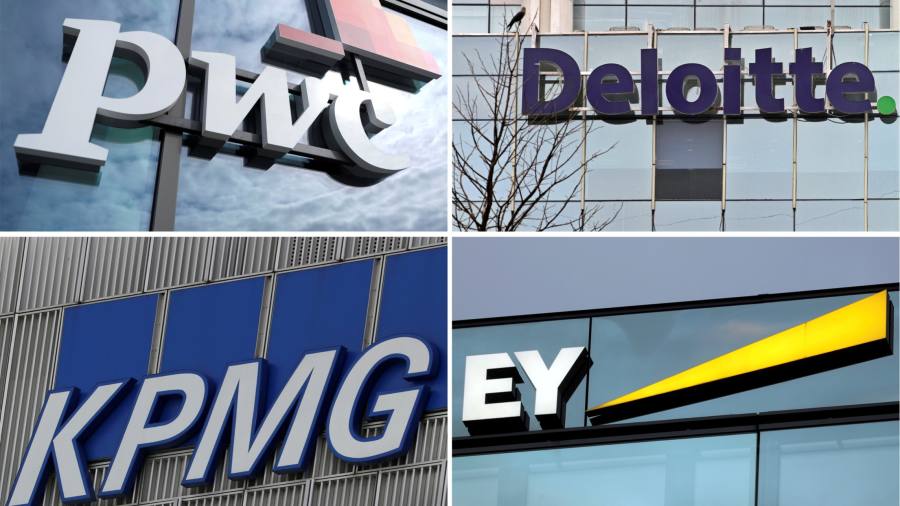
The cost of plans to break the dominance of the Big Four accounting firms by forcing the largest UK companies to hire two sets of auditors has risen fivefold to about £1bn over 10 years, according to the latest government estimates.
The impact of the “managed shared audit” proposal was put at £210mn last year as part of a public consultation on a long-awaited package of audit and corporate governance reforms but has increased sharply after further work by officials, according to four people briefed on the matter.
Under the proposal, FTSE 350 companies audited by one of the Big Four — Deloitte, EY, KPMG and PwC — would be required to hire a smaller firm to carry out up to 30 per cent of the work.
The policy is aimed at increasing the number of players at the top end of the audit market and minimising disruption if one of the Big Four were to collapse. The quartet currently check the accounts of 99 of the FTSE 100 and about 87 per cent of the mid-cap FTSE 250.
The increased costs of about £100mn a year would equate to about 8 per cent of the aggregate audit fees paid by the FTSE 350 last year, based on analysis by data provider Audit Analytics.
The bulk of those would be borne by roughly 150 companies in the FTSE 350 that use a Big Four auditor and have subsidiaries deemed suitable for inspection by a smaller firm. Many accountants expect shared audits would lead to duplication of work and higher fees.
The rising cost projections, which officials have yet to finalise, are likely to be seized on by opponents of the reform.
Deloitte, EY and PwC have come out against the proposal while KPMG has questioned whether the system would work in practice. BDO and Grant Thornton, the two largest challengers to the Big Four, have signalled they may prefer to win more FTSE 250 audits on a solo basis than to participate in a large number of shared audits.
“The challenge will be: how do you justify this amount of cost if you’re not going to get a radically different-looking auditor landscape?” said a senior Big Four partner.
The £1bn figure has alarmed supporters of shared audits, which include the Financial Reporting Council, the UK’s accounting regulator, which worked with the government on last year’s cost projections. The watchdog was expected to challenge the updated figures “quite strongly” once it was provided details of the underpinning assumptions, said one person with knowledge of the process.
The government has already watered down key elements of its proposed overhaul of boardroom rules, developed in response to corporate failures such as those at retailer BHS in 2016, outsourcer Carillion in 2018 and café chain Patisserie Valerie in 2019.
In May, ministers dropped plans to introduce a UK version of the US Sarbanes-Oxley Act requiring directors to sign off on companies’ internal financial controls and scaled back plans to sweep more companies into a tighter regulatory system for so-called public interest entities. The move followed pressure to avoid imposing additional regulatory costs on businesses.
The government said managed shared audits were “the best approach to reforming the market” but would not comment on the projected costs of the policy until it published a revised impact assessment alongside the draft legislation “in due course”.
It added that the wider reforms would include a new, strengthened regulator and would significantly improve audits and corporate governance in the UK. The FRC said it was working closely with the government “on progressing much needed reforms”.